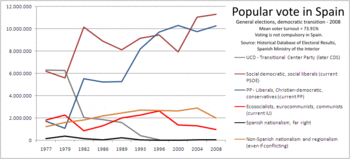Spanish society after the democratic transition facts for kids
After Spain became a democracy in the late 1970s, daily life changed a lot. These big changes are known as La Movida, which means "The Movement." This was a huge shift from how things were during Franco's rule, especially in the 1940s and 1950s. Spain's social values and attitudes became modern, just like its economy and government.
Under Francisco Franco, Spain had very conservative social values. Laws and church rules kept families traditional. They also controlled how people expressed themselves in media like newspapers and movies. But by the 1960s, people's values were changing faster than the laws. This caused tension. Even the Catholic Church started to become less conservative. The government tried to respond with some small changes. However, Spanish society was changing deeply. People were connecting more with the outside world. Many people moved from farms to cities. Also, European tourists visited "sunny Spain." Many Spanish workers went to jobs in countries like France, Switzerland, and West Germany. These contacts brought new ideas to Spain.
Women's Changing Roles in Spain
One of the biggest changes in Spain was the role of women. For a long time, Spanish society believed women should be wives and mothers. They had few chances for professional careers. Divorce was not allowed.
After democracy returned, women's lives changed a lot. More women started working. In the past, very few women had jobs outside the home. By the late 1970s, 22% of adult women worked. By 1984, this number grew to 33%. This was similar to other European countries. Women also started to achieve equal numbers with men in education. In 1983, about 46% of university students were female.
During Franco's time, laws treated married women unfairly. A wife needed her husband's permission, called the permiso marital, for almost everything. This included working, owning property, or even traveling. These unfair laws began to change just before Franco died. The permiso marital was removed in 1975. Divorce became legal in 1981. Laws about family money also changed that same year.
Before 1981, marriages in Spain had to follow Catholic Church rules. Since the church did not allow divorce, marriages could only end through a difficult process called annulment. This was only for very specific cases and was hard to get. Many Spaniards wanted divorce to be legal. In 1981, the Spanish Parliament finally approved a divorce law. This law allowed marriages to end after two years of legal separation. While it was a big step, not everyone rushed to get divorced.
Even with these improvements, people knew that getting full equal rights for women would take time. Today, women have a much bigger role in Spain. This is especially true in politics and the workplace. New laws have removed many types of discrimination. Younger generations see old-fashioned ideas about men and women as outdated. Spain now has one of the lowest birth rates in the world. Families often have one or two children. Parents are also having children later in life.
Society's Views on Politics and Religion
After 36 years of Franco's rule, Spanish society became more secular and left-leaning. Over 40 years of liberal democracy, the social democratic Spanish Socialist Workers' Party (PSOE) governed for 21 years. The conservative People's Party (PP) has also grown stronger. Regions like Andalusia and Extremadura have had PSOE governments since democracy returned. The Ecosocialist-Eurocommunist United Left is a smaller political force.
Patriotism is not very strong in Spain. This is because Franco's regime used national symbols too much. However, regional identities are strong. This is especially true in Catalonia and the Basque Country.
Roman Catholicism is still the biggest nominal religion in Spain. But many Spaniards, especially young people, do not follow Catholic teachings. They also do not go to Mass regularly. Being agnostic or atheist is socially accepted. This is similar to other parts of Western Europe. Other religions like Protestantism or Islam are growing. This is mostly due to immigrants. Debates in Spain are more about politics than religion.
Spain is considered one of the most culturally liberal countries. It is very friendly towards LGBT people. In 2015, 84% of Spaniards believed that same-sex marriage should be allowed. In 2005, Spain became the third country in the world to legalize same-sex marriage.
See also
 In Spanish: Posfranquismo para niños
In Spanish: Posfranquismo para niños
- Movida viguesa
- Spanish transition to democracy
 | Tommie Smith |
 | Simone Manuel |
 | Shani Davis |
 | Simone Biles |
 | Alice Coachman |


